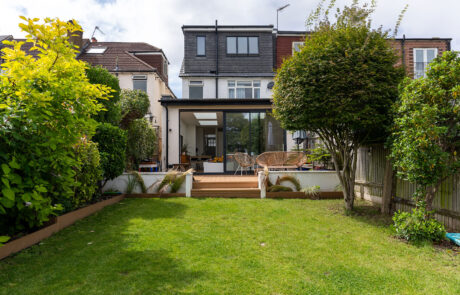
When it comes to expanding your home, choosing between a double storey extension and a single storey extension can be a significant decision. Both options offer unique benefits and come with their own set of considerations. To help you make an informed choice that best suits your needs, let’s compare the advantages and key factors of each.
1. Maximising Space
Double Storey Extensions:
- More Space: A double storey extension effectively doubles the amount of space you can add to your home without taking up additional land. This is ideal for growing families who need extra bedrooms, bathrooms, or a home office.
- Better Use of Land: If your property has limited outdoor space, a double storey extension allows you to expand vertically, preserving your garden or yard area.
Single Storey Extensions:
- Ground-Level Expansion: A single storey extension is perfect if you want to expand your living space, such as adding a larger kitchen, a new dining room, or a sunroom, all on one level.
- Easier Access: All the additional space is on the same level, making it easier to access and ideal for households with members who prefer to avoid stairs.
2. Cost Considerations
Double Storey Extensions:
- Higher Initial Costs: Double storey extensions generally require more structural work, including reinforcing foundations and installing additional support, which can increase the overall cost.
- Cost-Effective Space Addition: While the initial cost is higher, the cost per square metre often ends up being lower than single storey extensions, as you’re gaining more space for a relatively smaller increase in construction costs.
Single Storey Extensions:
- Lower Initial Costs: Typically, single storey extensions are less expensive to build, as they involve less structural complexity.
- Potentially More Affordable: For those on a tighter budget, a single storey extension might be more manageable, especially if you only need a modest amount of extra space.
3. Planning Permission and Regulations
Double Storey Extensions:
- More Stringent Regulations: Double storey extensions often face stricter planning permission requirements, particularly concerning height, overlooking neighbouring properties, and maintaining the character of the neighbourhood.
- Longer Approval Process: Due to the complexity and potential impact on surrounding homes, securing planning permission for a double storey extension can take longer.
Single Storey Extensions:
- Easier to Obtain Approval: Single storey extensions are generally less invasive and may fall within permitted development rights, making planning permission easier to obtain.
- Fewer Restrictions: There are typically fewer restrictions on the height and impact of single storey extensions, simplifying the design and approval process.
4. Impact on Your Home’s Value
Double Storey Extensions:
- Higher Value Increase: Double storey extensions can significantly increase the value of your home, especially if they add additional bedrooms or bathrooms, which are highly desirable features for potential buyers.
- Future-Proofing: Adding more bedrooms and living space can make your home more appealing in the long term, especially in areas where space is at a premium.
Single Storey Extensions:
- Value Addition Depends on Functionality: The value added by a single storey extension depends largely on how the space is used. A well-designed extension that enhances the living area can still boost your home’s value, especially if it improves the flow and functionality of your home.
- Appeal to Specific Buyers: Single storey extensions can appeal to buyers looking for easy access and open-plan living spaces, making your home attractive to a different demographic, such as retirees or young families.
5. Disruption During Construction
Double Storey Extensions:
- Longer Construction Time: Due to the complexity of the project, double storey extensions generally take longer to complete, leading to more prolonged disruption.
- Greater Structural Impact: The construction of a double storey extension is more likely to require temporary relocation or significant adjustments to your daily living during the build.
Single Storey Extensions:
- Shorter Construction Time: Single storey extensions are usually quicker to build, meaning less disruption to your home life.
- Less Intrusive: As most of the work happens on one level, you may be able to continue living in your home with minimal disturbance throughout the construction process.
Conclusion: Which Is Right for Your Home?
The decision between a double storey extension and a single storey extension ultimately depends on your specific needs, budget, and long-term goals for your property.
- Choose a Double Storey Extension if you need significant additional space, want to maximise your property’s value, and are willing to invest in a more complex project.
- Opt for a Single Storey Extension if you’re looking for a more affordable, quicker solution that enhances your ground-floor living space without the need for extensive structural changes.
At Raynes Construction, we specialise in both double and single storey extensions, offering expert guidance and high-quality craftsmanship to bring your vision to life. Contact us today for a free consultation and find out how we can help you choose the right extension for your home.











Comments (0)